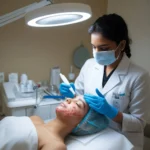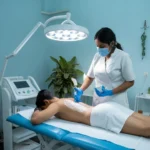How to Tighten Stomach Skin Postpartum and Treat Loose Skin After Pregnancy
- Home
- Skin specialist
- how to tighten stomach skin postpartum
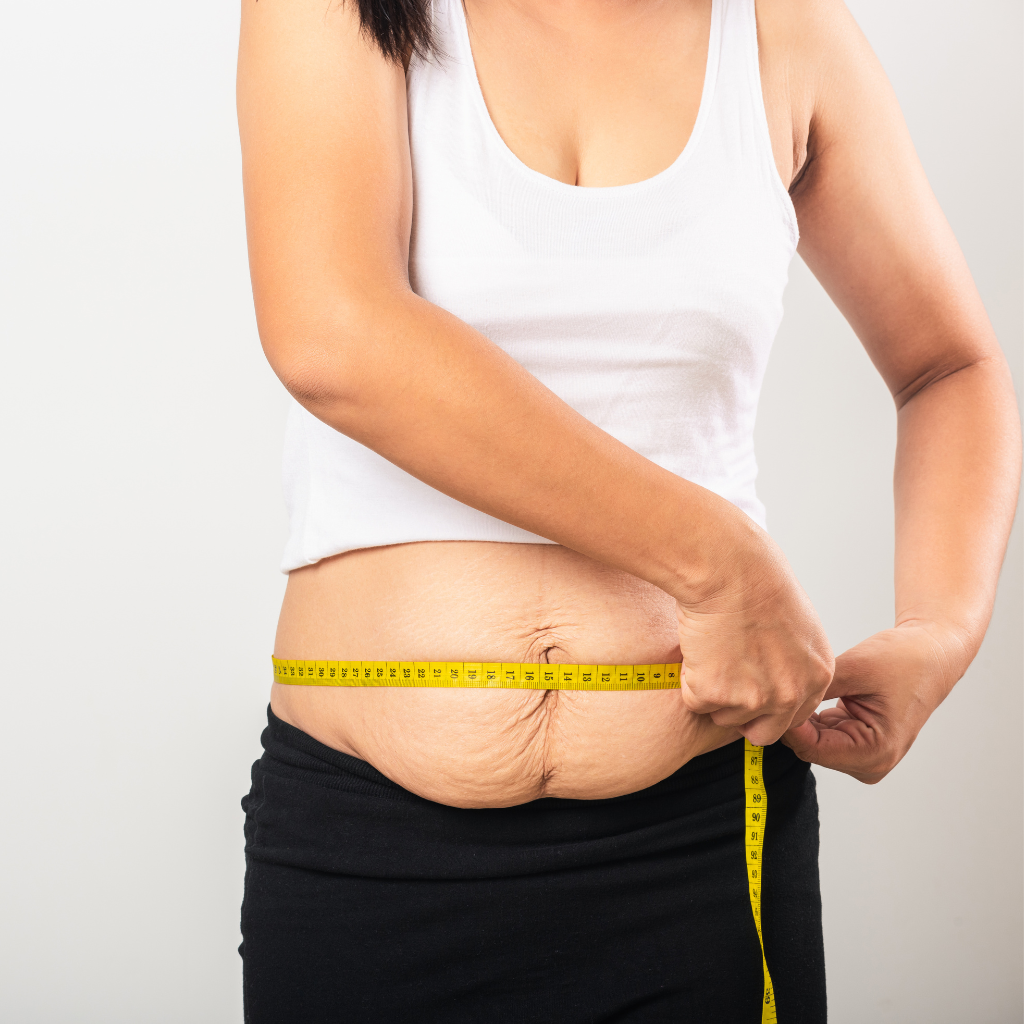
Postpartum loose belly skin is influenced by factors such as skin stretching, hormonal shifts, and genetics. To tighten this skin, engage in core exercises, maintain a nutrient-dense diet, and guarantee proper hydration. Topical treatments with ingredients like retinoids and peptides may enhance results. For further improvements, consider options like ultrasound or radiofrequency therapy. Clinics offering advanced skin care solutions can provide access to such non-invasive treatments and expert guidance. An approach combining nutrition, skincare, and technology offers a holistic solution. Additional details can provide deeper insights into effective techniques.
Key Takeaways
- Engage in core exercises to strengthen and tighten abdominal muscles postpartum.
- Maintain a balanced diet rich in vitamins and antioxidants to enhance skin elasticity.
- Stay hydrated to support skin moisture and overall elasticity.
- Consider non-invasive treatments like radiofrequency or ultrasound for collagen production.
- Use topical treatments with retinoids and peptides to improve skin firmness.
How to Tighten Stomach Skin Postpartum Effectively?
Postpartum loose belly skin is primarily attributed to the rapid stretching and contraction of skin tissue during and after pregnancy, which can compromise skin elasticity.
Effective strategies for tightening this loose skin can include targeted exercises, adequate hydration, and the use of topical treatments that promote collagen production. These methods can also be effective for those looking to tighten loose skin after weight loss, as both scenarios involve improving skin firmness and elasticity.
Additionally, enhancing skin elasticity through nutritional support and non-invasive dermatological procedures can be considered to optimise postpartum skin recovery.
What Causes Loose Belly Skin After Pregnancy to Form?
A significant factor contributing to loose belly skin after pregnancy is the stretching of the skin beyond its natural elasticity.
During pregnancy, the skin and muscles accommodate weight gain, leading to postpartum belly loose skin. The abdominal area after pregnancy often exhibits the appearance of loose skin due to the following reasons:
- Weight Gain During Pregnancy: Rapid weight gain causes the skin to stretch, resulting in excess skin and fat.
- Hormonal Changes: Fluctuations in hormone levels affect skin elasticity, contributing to stomach skin after pregnancy.
- Genetic Predisposition: Genetic factors determine how well the skin retracts post-pregnancy.
- Age-Related Factors: Age influences skin elasticity, potentially exacerbating loose skin after pregnancy.
Understanding these causes is essential for addressing postpartum belly loose skin effectively.
What Are Safe Ways to Tighten Loose Skin Postpartum?
Although postpartum recovery can be challenging, several evidence-based methods exist for safely tightening loose stomach skin. Engaging in targeted exercises that focus on the core can help tighten the abdominal muscles and reduce loose skin postpartum. Incorporating a balanced diet rich in vitamins and antioxidants can improve skin elasticity and promote skin tightening after pregnancy. Skin care routines that include moisturising and gentle exfoliation may help tighten loose skin, enhancing overall skin health. Additionally, maintaining proper hydration levels is vital to support skin elasticity. Below is a summary of safe methods to tighten postpartum belly skin:
| Method | Benefits | Considerations |
|---|---|---|
| Core exercises | Tighten abdominal muscles | Consistent practice required |
| Balanced diet | Improve skin elasticity | Nutrient-rich food focus |
| Skin care routine | Help tighten loose skin | Regular application needed |
| Hydration | Promote skin elasticity | Adequate water intake essential |
How Can I Improve Skin Elasticity in My Belly Area?
How can one effectively enhance skin elasticity in the postpartum belly area? To tighten loose skin after pregnancy, various strategies can be employed. Evidence suggests that adopting a holistic approach is pivotal for improving skin elasticity.
Below are four methods to tighten and support skin health in the postpartum belly:
- Hydration: Consistent water intake helps improve skin elasticity and reduce loose skin by maintaining overall skin health.
- Nutrition: Consumption of a balanced diet rich in antioxidants and vitamins supports collagen production, essential for belly skin tightening.
- Exercise: Engaging in targeted core strengthening exercises can help tighten the underlying muscles, which in turn enhances the appearance of the skin.
- Topical Treatments: Application of creams containing retinoids and peptides may improve skin texture and elasticity.
How Do I Get Rid of Loose Skin After Pregnancy?
Postpartum individuals often seek effective methods to address loose skin, with treatments such as laser therapy, radiofrequency, and ultrasound showing promising results in enhancing skin elasticity.
Additionally, engaging in targeted physical exercises and maintaining a balanced diet can contribute to the gradual firming of abdominal skin.
The timeline for noticeable improvements varies, typically ranging from several months to over a year, contingent on individual physiological factors and the chosen interventions.
Which Skin Tightening Treatments Help Postpartum Bellies?
A variety of skin tightening treatments can assist in addressing postpartum belly concerns by promoting skin firmness and elasticity.
These interventions focus on reducing excess skin and improving the appearance of the stomach after pregnancy.
Key treatments include:
- Tummy Tuck: Surgically removes excess skin and tightens abdominal muscles, providing immediate results for tightening loose skin postpartum.
- Laser Skin Resurfacing: Utilises laser technology to stimulate collagen production, effectively reducing loose skin after pregnancy and improving skin texture.
- Radiofrequency Therapy: A non-invasive skin tightening treatment that uses radio waves to heat deeper skin layers, encouraging collagen production and elasticity.
- Ultrasound Therapy: Uses sound waves to deeply penetrate the skin and stimulate collagen production and firming the postpartum belly.
Each method varies in invasiveness, recovery time, and outcomes.
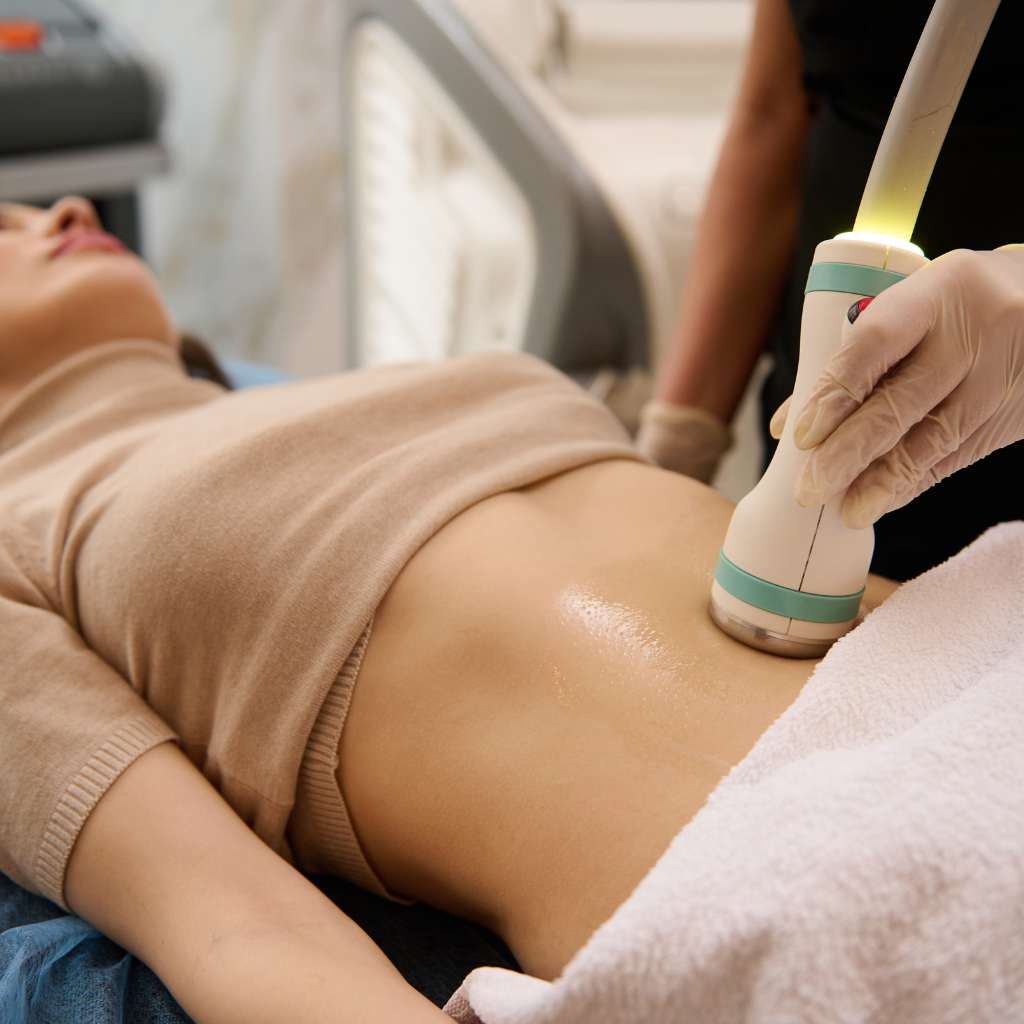
What Can I Do to Firm Stomach Skin After Pregnancy?
Indeed, addressing loose skin after pregnancy involves a multifaceted approach that combines lifestyle modifications, targeted exercises, and skincare regimens. To effectively tighten your skin, individuals should engage in strength training, which builds muscle mass, thereby reducing loose belly skin. Incorporating collagen-rich foods into one’s diet can also help tighten your skin by enhancing dermal elasticity. Additionally, proper hydration and use of topical treatments containing retinoids or hyaluronic acid can firm stomach skin.
| Strategy | Benefits | Application |
|---|---|---|
| Strength Training | Builds muscle, reduces loose skin | Regular exercise routines |
| Collagen-Rich Diet | Enhances skin elasticity | Include in daily meals |
| Topical Treatments | Hydrates and tightens skin | Apply as directed |
These methods collectively aid in treating loose skin after pregnancy and can help prevent loose skin after pregnancy, ultimately contributing to a firmer abdominal profile.
How Long Does It Take to Tighten Stomach Skin Postpartum?
How long does it take for stomach skin to tighten postpartum? The timeframe varies considerably based on several factors. Generally, it may take several months to over a year for the stomach skin to show noticeable firmness after having given birth.
Factors influencing this process include:
- Amount of Loose Skin: Greater excess fat and loose skin typically require more time for visible skin firming.
- Age and Skin Elasticity: Younger individuals often experience faster recovery due to higher natural skin elasticity.
- Diet and Exercise: A balanced diet and regular physical activity can help improve skin appearance by reducing sagging skin.
- Genetic Factors: Genetic predispositions can impact the rate at which stomach skin tightens post-pregnancy.
Consistent efforts in these areas can optimise postpartum skin recovery.
How Can You Prevent Loose Skin After Pregnancy Naturally?
Preventing loose skin postpartum can be approached through evidence-based strategies that focus on at-home interventions, nutritional optimisation, and lifestyle modifications.
Engaging in targeted exercises and maintaining a balanced diet rich in collagen-enhancing nutrients are pivotal in enhancing skin elasticity.
Furthermore, consistent hydration and protective skin care practices are essential habits that contribute to the natural prevention of postpartum skin laxity.
What Are the Best Ways to Tighten Loose Skin at Home?
Why is it that some women seem to recover their pre-pregnancy form with remarkable ease, while others struggle with loose skin? The elasticity of skin post-pregnancy is influenced by several factors, including genetics, age, and the amount of weight gained during pregnancy.
To tighten loose skin postpartum, several home-based strategies can be employed effectively:
- Hydration: Keeping the skin hydrated can help with its elasticity and prevent loose skin. Adequate water intake and moisturiser can aid this process.
- Regular Exercise: Incorporating strength training and cardio can help rid the body of excess fat and tighten loose skin.
- Massage Therapy: Regular massages improve blood circulation and skin elasticity.
- Topical Treatments: Application of creams rich in collagen or elastin can further enhance skin firmness after pregnancy and childbirth.
How Does Nutrition Help Improve Skin Elasticity Postpartum?
Remarkably, nutrition plays a pivotal role in enhancing skin elasticity postpartum, providing a natural and effective method to counteract loose skin. A balanced diet rich in essential nutrients can notably improve skin elasticity and contribute to tightening excess skin around the belly following pregnancy.
Protein intake is essential, as it supports collagen synthesis, a structural protein fundamental for maintaining skin’s firmness. Additionally, vitamins A, C, and E, renowned for their antioxidant properties, safeguard skin against oxidative stress, thereby promoting regeneration.
Omega-3 fatty acids, found in fish and flaxseeds, enhance skin barrier function, while zinc supports tissue repair. Hydration is equally important, as it maintains skin moisture and suppleness.
Consequently, a nutrient-dense diet becomes indispensable for postpartum skin recovery.
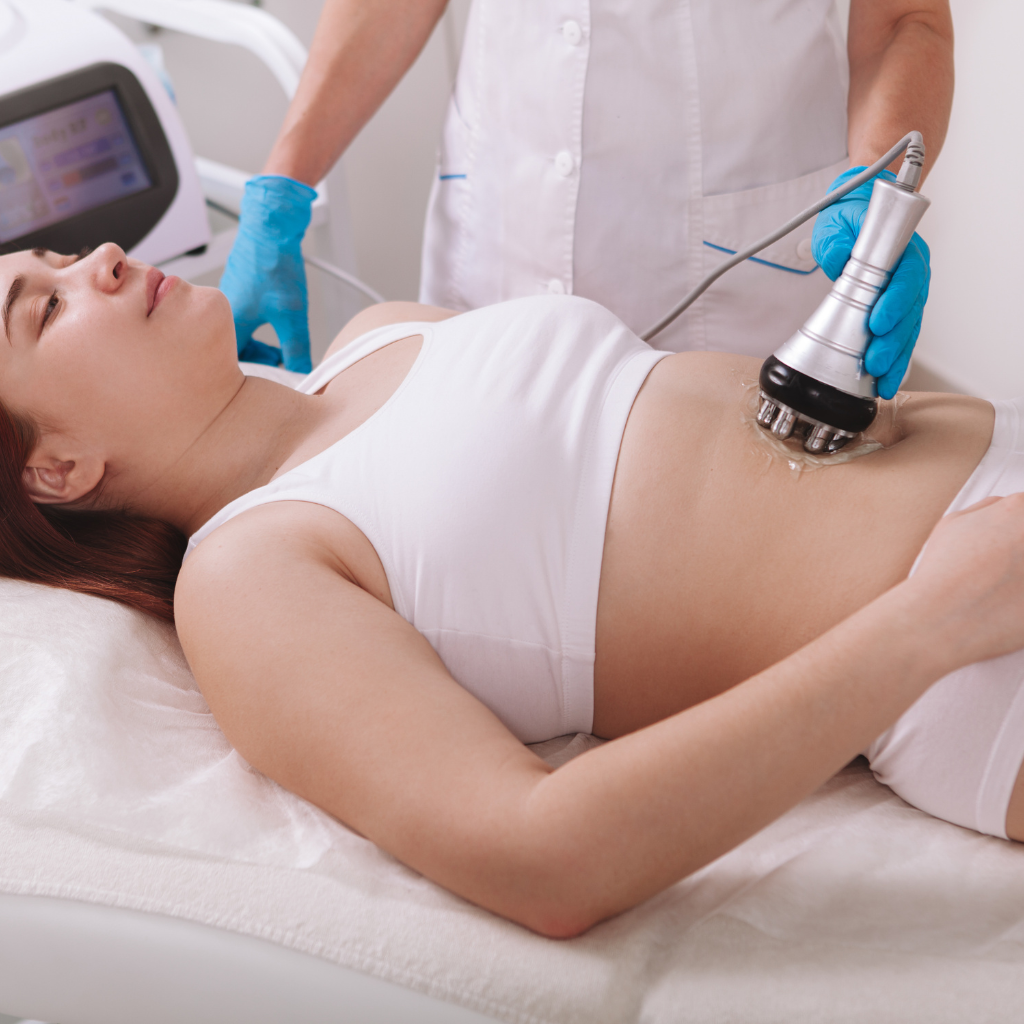
What Habits Prevent Loose Skin After Pregnancy?
To effectively prevent loose skin after pregnancy naturally, adopting certain habits can be essential. Engaging in evidence-based practices can greatly contribute to tightening the skin postpartum.
These habits include:
- Regular Exercise: Incorporating cardiovascular and strength-training exercises can enhance skin elasticity by building underlying muscle mass, which helps tighten the belly and reduce excess skin.
- Balanced Nutrition: Eating a diet high in collagen-supporting nutrients like vitamin C, zinc, and protein is essential for promoting skin healing and regeneration.
- Hydration: Maintaining adequate hydration levels supports skin elasticity, as water is essential for collagen synthesis and overall skin health.
- Skincare Routine: Utilising topical treatments with ingredients like retinoids can stimulate collagen production, effectively treating and preventing loose skin postpartum.
These habits provide a structured approach to managing skin health after pregnancy.
What Skin Firming Options Help With Postpartum Belly?
Postpartum skin laxity can be addressed through a combination of targeted exercise regimens and clinically evaluated topical products.
Evidence suggests that exercises focusing on core strengthening may enhance muscle tone and improve skin elasticity, aiding in the reduction of loose belly skin that may result from weight gain during pregnancy.
Additionally, products formulated with active ingredients such as retinoids and peptides have shown efficacy in promoting collagen synthesis and skin firming. Many of these formulations also help keep the skin hydrated, further supporting recovery and elasticity in the postpartum period.
Can Exercise Help Tighten Loose Belly Skin Postpartum?
How effectively can exercise contribute to tightening loose belly skin postpartum? Exercise can be a beneficial tool in addressing loose skin after nine months of pregnancy. Engaging in targeted physical activity may help tighten stomach skin by enhancing muscle tone and promoting skin elasticity. For those who experience loose skin after childbirth, consistent workouts can help reduce loose skin gradually over time by improving underlying muscle structure and circulation.
Consider the following points:
- Strength training: Incorporates exercises like planks and squats, which may aid in muscle development beneath the skin.
- Cardiovascular exercise: Enhances circulation, potentially improving skin elasticity.
- Hydration and nutrition: Supports overall skin health, which can help you tighten and keep your skin firm.
- Consistency: Regular exercise is essential in cases of loose skin to see noticeable improvements.
Ultimately, exercise can give your skin a supportive role in regaining firmness postpartum.
Which Products Help Tighten Loose Skin After Pregnancy Effectively?
When considering how to tighten loose skin after pregnancy effectively, one might explore the use of topical treatments and skin care products formulated specifically for skin firming.
These products often contain active ingredients like retinoids, peptides, and hyaluronic acid, which may assist in tightening loose skin on your belly by promoting collagen synthesis and improving elasticity.
Creams and serums that heat the skin can further enhance blood circulation, potentially aiding in the removal of excess skin. Consistent application throughout their pregnancy and postpartum period can help mitigate the risk of loose skin.
Additionally, exfoliation products can improve the appearance by removing dead cells from the top layer of skin, contributing to a more toned and firmed look.
How Can I Treat Loose Skin After Pregnancy Safely?
Postpartum individuals seeking to address loose skin can explore various non-invasive skin tightening treatments, such as radiofrequency and ultrasound therapies, which have been shown to enhance collagen production and improve skin elasticity.
Preventative measures, including maintaining a balanced diet and engaging in regular physical activity, may mitigate the extent of skin laxity in future pregnancies.
Additionally, topical treatments like retinoids and peptides, along with consistent hydration, offer potential benefits in tightening skin without resorting to surgical interventions.
Is There a Skin Tightening Treatment for Stomach Skin?
Curiously, many new mothers inquire about the availability and efficacy of skin tightening treatments for postpartum abdominal skin.
Various medical and non-invasive options exist, each with distinct outcomes. To understand how to get rid of loose skin postpartum, it is critical to explore:
- Tummy Tuck Surgery: A surgical procedure that removes excess skin and tightens abdominal muscles, particularly effective around the belly button area.
- Laser Therapy: Non-invasive, stimulates collagen production to enhance skin elasticity, although multiple sessions may be required.
- Radiofrequency Treatments: Utilises energy to penetrate deep layers, potentially reducing loose skin.
- Topical Creams: Contain retinoids or collagen-enhancing ingredients; however, their efficacy is limited compared to surgical options.
Each method has unique benefits and limitations; therefore, skin may respond differently based on individual circumstances.
How Do I Prevent Loose Skin After Pregnancy in Future?
Effectively managing loose skin after pregnancy is a concern for many women. Preventative measures can markedly influence skin elasticity and minimise postpartum skin laxity.
Maintaining a balanced diet rich in vitamins C and E, collagen, and antioxidants can support skin health. Regular exercise, particularly strength training, enhances muscle tone and can contribute to a firmer appearance. Hydration is essential, as adequate water intake maintains skin elasticity.
Additionally, gradual weight gain during pregnancy, as recommended by healthcare providers, can prevent excessive stretching of the skin. Utilising topical treatments containing retinoids or hyaluronic acid may also enhance skin elasticity.
These interventions, grounded in scientific evidence, can be integrated into a lifestyle to potentially reduce the risk of developing loose skin post-pregnancy.
What Are Effective Ways to Tighten Skin Without Surgery?
While preventative measures are beneficial, many women seek effective methods to address existing loose skin post-pregnancy without resorting to surgery. Non-invasive approaches focus on promoting collagen production and enhancing skin elasticity.
- Topical Treatments: Formulations containing retinoids and peptides are clinically shown to enhance skin firmness by stimulating collagen synthesis.
- Radiofrequency Therapy: This modality utilises electromagnetic waves to induce dermal heating, thereby tightening collagen fibres and encouraging neocollagenesis.
- Ultrasound Therapy: High-intensity focused ultrasound (HIFU) targets deep skin layers, promoting collagen remodelling and tightening over several months.
- Laser Treatments: Fractional laser technology penetrates the epidermis, triggering a wound-healing response that boosts collagen production and skin tightening.
These methods offer safe, evidence-based alternatives for postpartum women seeking skin rejuvenation without surgical intervention.
Conclusion
In summary, postpartum skin tightening is a multifaceted process that can be effectively addressed through a combination of strategies. Incorporating a balanced diet, regular exercise, and adequate hydration can enhance skin elasticity naturally. Additionally, non-invasive treatments such as ultrasound therapy and radiofrequency provide technological solutions for skin firming. Preventative measures, including gradual weight gain during pregnancy and consistent skincare routines, further support skin health. Prioritising safe and scientifically-backed approaches guarantees the best results in managing postpartum loose skin.




